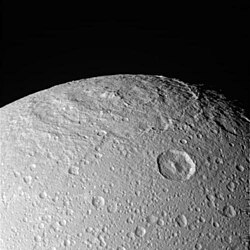Evander is the largest impact basin on Saturn's moon Dione. It is named after the mythological Roman hero Evander of Pallene, son of Hermes. The name Evander was officially approved by the International Astronomical Union (IAU) on 17 March 2008.[1]
 Evander as viewed by the Cassini–Huygens orbiter | |
| Feature type | Multi-ring impact basin |
|---|---|
| Location | Dione |
| Coordinates | 57°00′S 145°00′W / 57.00°S 145.00°W[1] |
| Diameter | 350 km |
| Discoverer | Cassini–Huygens |
| Eponym | Evander of Pallene, Roman hero |
Geology and characteristics
editEvander is a large multi-ring impact basin located in Dione's southern hemisphere. Evander is estimated to be relatively young; estimates range from 2 billion years down to as recently as under 1 billion years old. Surrounding Evander is an extensive ejecta blanket, and a significant portion of Dione's small (< 20 km) craters may be the result of debris blasted out from the impact event that created Evander. Evander is a significantly relaxed crater, with its topographic profile having been "muted" since its formation and resulting in a shallower impact basin than would otherwise be expected. That Evander is relaxed indicates that Dione was thermally active until recently, with a surface heat flux of over 60 mW/m2.[2][3]
References
edit- ^ a b "Evander". Gazetteer of Planetary Nomenclature. USGS Astrogeology Research Program. (Center Latitude: −57.00°, Center Longitude: 145.00°; Planetographic, +West)
- ^ White, Oliver L.; Schenk, Paul M.; Bellagamba, Anthony W.; Grimm, Ashley M.; Dombard, Andrew J.; Bray, Veronica J. (May 2017). "Impact crater relaxation on Dione and Tethys and relation to past heat flow". Icarus. 288: 37–52. Bibcode:2017Icar..288...37W. doi:10.1016/j.icarus.2017.01.025.
- ^ Kirchoff, Michelle R.; Schenk, Paul (August 2015). "Dione's resurfacing history as determined from a global impact crater database". Icarus. 256: 78–89. Bibcode:2015Icar..256...78K. doi:10.1016/j.icarus.2015.04.010.
External links
editEvander Crater at the IAU Gazetteer of Planetary Nomenclature